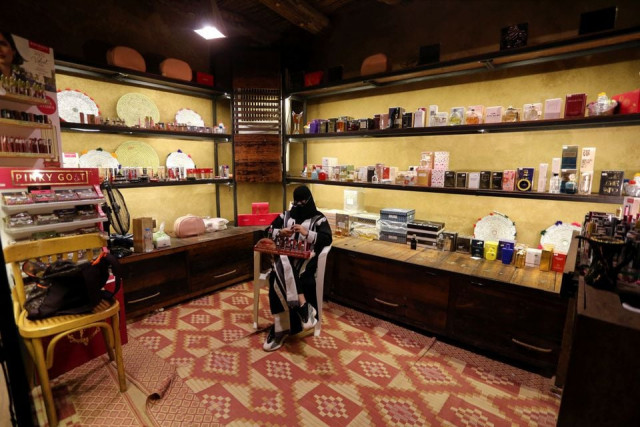Unfair and ugly : Cosmetic industry perpetuates female objectification
Marketing of unrealistic beauty standards has fuelled women’s insecurities

For a nation which requires half its population to own a flawless smile, rosy-white complexion and zero-sized waist before fitting them into the box of desirability and caricature of marriageability, the burgeoning of the cosmetic industry, fails to astound.
Since women in our society are hardwired into believing that their true value lies only in their ability to secure the companionship of a man through the institution of marriage, a myriad of efforts is undertaken by women and their families to accentuate their physical appearance in the hopes of either getting married or staying married. Therefore, whether a woman wants to grab the distracted attention of a prospective suitor or monopolize the wandering gaze of a wedded husband, beauty brands and laser clinics are there to save the day.
Conscious of women’s deepest insecurities, cosmetic businesses capitalize on their instilled desire to look prettier than the rest, by offering them a variety of beautification options ranging from quick fix whitening creams for a brightened skin tone to tummy tuck surgeries for a slender physique.
“More than 80 per cent of the women and girls who visit me for beauty treatments convey their desire to look prettier than other women in their social circle. This immense pressure to look desirable forces them to seek substandard whitening treatments and aesthetic procedures, which are usually uncertified and can have harmful repercussions in the long run,” revealed Annie, a beautician and owner of a renowned beauty salon in Lahore, who went on to assert that the demand for cosmetic treatments had blown up over the past few years.
Read Crackdown against beauty parlours on the cards
Sharing Annie’s concerns on the increasing demand for unsafe cosmetic treatments among women, was Dr Agha Nasrullah Khan, a consultant skin specialist, who warned against the popular usage of whitening creams which contain dangerously high concentrations of mercury, hydroquinone, ascorbic acid, and retinoic acid.
“As per the findings of a report by the Pakistan Council of Scientific and Industrial Research (PCSIR), 57 out of 59 whitening creams contained excess concentrations of mercury. This has led to an increase in the incidence of acne, pigmentation, skin thinning and hirsutism among women. Similarly, the uncertified administration of glutathione, platelet-rich plasma (PRP) injections for skin whitening and laser lipolysis for fat reduction can instigate a plethora of gestational issues among women, which compromise the health of their future children,” elaborated Dr Khan.
Despite their evident health hazards, whitening treatments and fat reduction surgeries are a savior for women of marriageable age, who have to ritually parade in front of a scrutinizing matchmaker, whose scanning eyes are quick to detect even the tiniest of imperfections, let alone the obvious ones.
“A dusky skin tone and excess body fat are considered outright imperfections by boys and their families, which overtly demand that their daughters-in-law be fair skinned and thin looking. Hence, so many women turn to creams and clinics for help in order to gain success in the marriage market,” shrugged Naila, a seasoned matchmaker.
According to an assessment carried out by the Express Tribune, markets selling cheap, substandard beauty creams specifically targeting female consumers, exist at multiple corners of Lahore, with the biggest found at Shah Alam.
Similarly, the Punjab Healthcare Commission (PHC), has issued warnings against the operation of a large number of uncertified aesthetic clinics, which claim to target obesity, facial hair, pigmentation, acne scars and skin dullness but are jeopardizing the safety of clients by using untested products and employing inexperienced staff.
Read more India's 'brown beauty' makeup influencers go global
“These clinics market themselves through social media pages and attract a huge number of female clients towards their services,” said an official from the PHC.
Sociologists, however, are of the opinion that the obsession with fair skin is not novel since the population at large has had a colonial predisposition towards idolizing whiter looking people, especially women.
“Even the traditional folk tales that are narrated to children, almost always feature a youthful central character, a fairy or princess, who is described as having skin as white as milk. Hence, having white skin is seen not only as a standard of beauty but also of health and prosperity. Since affluence allows one to spend more time indoors, the skin tone of rich people is less affected by sunlight and pollution and looks relatively clean and fair,” opined Dr Khadija Asif, a sociologist.
Dr Asif also believes that a lack of representation of dusky complexions on popular media has allowed the obsession with fair skin to grow. “From advertisements and news broadcasts to drama serials and social media reels, white skinned women rule the screens. Other than this, the promotion of whitening treatments by social media influencers on TikTok and YouTube has only exacerbated the pressure among women to look fair,” observed Dr Asif.
“The pressure to look fair kicks in right from childhood and continues into adulthood when darker skinned girls are discriminated against by family, peers, matchmakers and even employers. Hence, they opt for cosmetic treatments in order to live successful lives,” asserted Fatima Tahir, a medical psychologist.
“Therefore, we must change our mindsets and end the discrimination against women based on their physical appearance. Success in any realm should have nothing to do with your skin tone or body type,” urged Tahir.
Published in The Express Tribune, December 11th, 2023.



















COMMENTS
Comments are moderated and generally will be posted if they are on-topic and not abusive.
For more information, please see our Comments FAQ